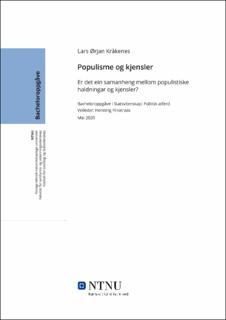Populisme og kjensler
Bachelor thesis
Permanent lenke
https://hdl.handle.net/11250/2661089Utgivelsesdato
2020Metadata
Vis full innførselSamlinger
Sammendrag
I dette arbeidet ser eg på samanhengen mellom populistiske haldningar og kjensler. Målet er å auke forståinga for at kjensler er viktig både i populisme og i politikk generelt. Oppfatninga om at kjensler er noko illegitimt og framandt hindrar ein frå å forstå populismens evne til mobilisering. Ved å studere den norske befolkninga i samband med stortingsvalet i 2017 kan eg kartlegge både tendensen til populistiske haldningar, samt kva kjensler som sett preg på befolkninga si oppfatning av samfunnsutviklinga. I dette arbeidet finn eg støtte til hypotesa mi om at det er ein link mellom sinne og frykt på den eine sida, og populistiske haldningar på den andre sida. Og at desse kjenslene ser ut til å spele ulikt inn i ulike former for populismar. In this work I look at the relationship between populist attitudes and feelings. The goal is to increase the understanding that feelings are important in both populism and politics in general. The notion that feelings are somewhat illegitimate and alien prevents one from understanding populism's ability to mobilize. By studying the Norwegian population in connection with the parliamentary elections in 2017, I can map both the tendency for populist attitudes, as well as how the population feel about the perceived development in society. In this work, I find support for my hypothesis that there is a link between anger and fear on the one hand, and populist attitudes on the other. And that these feelings seem to play differently into different forms of populism.
